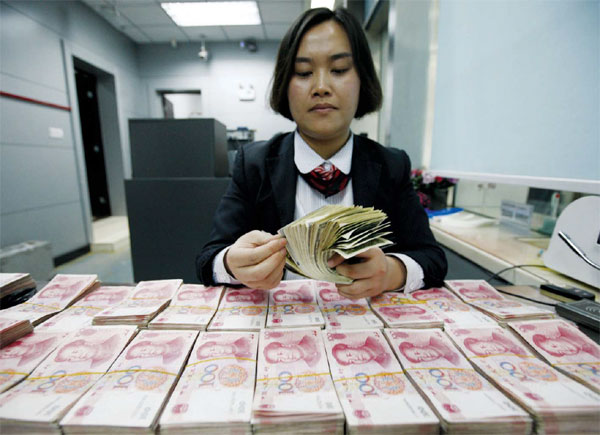Renminbi is 'still attractive'
Many analysts hold positive long-term view, despite recent depreciation against the dollar
Overseas investors are still keen to hold the yuan for investment in China's debt and equity markets, showing confidence in its long-term stability and credibility as a reserve currency despite the renminbi's depreciation against the dollar over the past two months, analysts say.
They believe the renminbi will become increasingly useful to hold as China's capital account controls open up to release more investment opportunities in China for foreign funds, while its inclusion in the International Monetary Fund's reserve currencies basket has given investors an incentive to increase renminbi asset allocations.
|
Analysts say the renminbi inclusion in the International Monetary Fund's reserve currencies basket has given investors an incentive to increase renminbi asset allocations. Xie Zhengyi / For China Daily |
Miranda Carr, a senior analyst at Haitong Securities UK Ltd, says investors may be more cautious about the renminbi after the Chinese central bank's recent intervention, but such sentiment will have limited impact because most central bank and sovereign wealth funds take a long-term view on their currency and international investment positions, so they are thinking five years ahead.
She says China's bond market will be attractive to foreign central banks and other institutional investors, as the yuan's inclusion in the IMF basket will demand a greater allocation of funds in the currency for investment.
Meanwhile, the Chinese stock market indexes' future inclusion in international indices will channel more funds into the country's stock market, which will also create overseas demand for the renminbi, she adds.
The renminbi, traditionally a pegged currency, has made significant progress in recent years to liberalize its exchange rate and grow its international usage with the goal of becoming a global reserve currency, which more accurately reflects the Chinese economy's global trade and investment dominance.
It reached a milestone in November with the IMF decision, with some economists estimating that at least $1 trillion of global reserves will switch into Chinese assets as more central banks and institutional investors increase their holdings in renminbi.
Yet the yuan's 1.5 percent depreciation against the dollar in December, and an additional 1.5 percent in the first week of January, has caused some market confusion.
China's record-breaking foreign exchange reserves decline of $108 billion in December also caused fears of large capital outflows, pointing to a lack of confidence in the Chinese economy.
In this context, the move by the People's Bank of China to limit the speed of renminbi's outflow and prevent its further depreciation in recent months have caused concern of a further sharp depreciation of the currency.
Coupled with the backdrop of A-share market turmoil, it led to confusion and increased concerns about China's economy, exchange rate policy and global markets.
Wang Tao, chief China economist at UBS, says a large deprecation is unlikely. First, the government is unlikely to use depreciation to boost growth, and second, China's sizable current account surplus should continue to provide a handsome offset to capital outflows.
In addition, China will take into consideration any likely negative feedback from major trading partners as it moves toward internationalization, she says.
Furthermore, even if the central bank does not want to deplete its foreign exchange reserves too quickly, it has other ways to limit the speed and scale of capital outflows, most notably by tightening existing rules on cross-border capital flows, Wang says.
Andrew Malcolm, a Hong Kong-based partner at Linklaters, adds that the renminbi's depreciation is "less apparent" than the frequently quoted headline figures because a major cause of the depreciation is the dollar's strengthening.
"The (central bank) has indicated now on a couple of occasions that it is guiding the renminbi fix by reference to a basket of currencies, including of its major trading partners, and by reference to this basket the depreciation is much less apparent," he says.
He adds that the central bank's short-term controls to avoid a sharp renminbi decline are justifiable, as well as consistent with its long-term goal to give the currency convertibility.
He explains that what China has set out to achieve is "managed convertibility", where the government retains control over potentially destabilizing flows of "hot money", a strategy that is seen as an important lesson taken from the Asian currency crisis of 1998. This strategy is not only compatible with the renminbi's convertibility but defined as part of it, he says.
The Asian currency crisis, which was not only detrimental to the East Asian economy but raised fears of a worldwide economic meltdown due to financial contagion, started with the financial collapse of the Thai baht after the Thai government was forced to float it due to a lack of foreign currency to support its currency peg to the US dollar.
Looking long term, Malcolm says efforts to further liberalize the economy give international investors greater confidence in the long-term strength of the Chinese economy, and increased inflows of capital as the capital account is liberalized should support the renminbi.
cecily.liu@chinadaily.com.cn



















